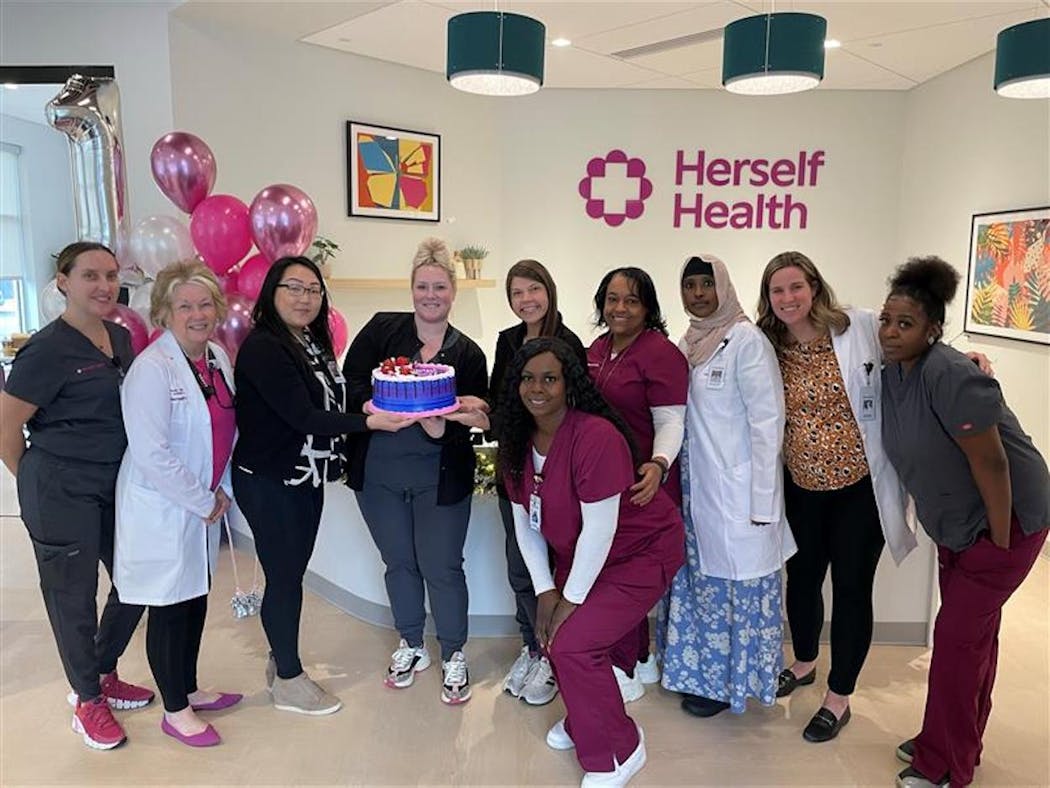A new group of medical clinics in the Twin Cities area aims to serve a portion of the population whose health status is so often overlooked that people tend to overlook that it's overlooked.
The group, Herself Health, offers services for women 65 and over. You don't have to be a woman in that age group to be treated there, but the clinics' main mission is providing holistic health and wellness services to a demographic segment that is often neglected, misdiagnosed, left out of research or told they just need to lose some weight.
Herself Health has locations in southwest Minneapolis, Crystal and the Highland Park neighborhood of St. Paul. A Roseville site is scheduled to open later this year.
The clinics don't just specialize in care for older women; they offer it in ways that differ from typical health care protocols, including longer visits with providers (30 to 60 minutes rather than the 15 to 30 minutes typical in most clinics), a holistic approach to care, community activities and respect for women's intuitive feelings about their own health.
"We recognize each woman as a whole multilayered person with psychological, physical and emotional layers," said Dr. Sarah Maier, Herself Health's regional medical director. "We're empowering women to take charge of their lives, to see the possibility for their transformation to getting the most out of their lives."
Women's health was long neglected in research. For a long time, most studies looked at groups of white men, with the findings applied to men of color and women as if there were no differences. A 1985 report led to improvements in the methodology but problems remain. Diseases that disproportionately affect women receive less research funding than diseases more often affecting men, even if the women's diseases cause more death and disability.
Women also are far more likely to be misdiagnosed or told their symptoms are caused by something minor, blithely attributing them to age or weight or imagination when they actually indicate a more serious condition. For example, a 2016 study found that women have a 50% higher chance of receiving an incorrect initial diagnosis after a heart attack.
"Women often present differently when they're having cardiac issues," Maier said. Instead of the stereotypical chest pain, "women might feel very fatigued, they might feel nauseous, they might feel like they have heartburn. That's one of the challenges in making the diagnosis. It has to be on provider's radar."
The 2016 study also found women 30% more likely to be misdiagnosed after a stroke. Autoimmune diseases, three times more common in women, take roughly five years to be correctly diagnosed, and female-specific conditions like endometriosis often take a decade of doctor visits before they're accurately identified, the study indicated.
Encouraging self-advocacy
Herself Health clinics provide the basic types of care: preventative, chronic and acute care, as well as on-site lab testing. But they also take a mind-body approach to wellness, addressing mental and social well-being as well as physical, with the goal of improving quality of life.
Social support and education are provided through events about sleep or hearing loss or fall prevention (falls are the leading cause of death by injury for people over 65). A "Walk With a Doc" series invited patients in groups — up to 50 at one point — to take hourlong walks with a rotating group of doctors, while conversing informally about general health matters.
The response from patients has been great, said Dani Meuleners, Herself Health's director of clinical operations. "People are telling their friends, they're talking about it at their book clubs."
Speaking of book clubs, a group organized by Herself Health read and discussed "Beyond Menopause: New Pathways to Holistic Health," a 2022 book by Carolyn Torkelson and Catherine Marienau.
The group of about 15 women "loved the community experience of talking about themselves and issues that they had," said Torkelson, a doctor who retired from clinical practice at the University of Minnesota's Women's Health Specialists Clinic in 2020 and is currently an adjunct associate professor in the U's Department of Family Medicine.
The book is divided into chapters covering health issues of particular interest to Herself Health's target market: menopause, sexual health, anxiety, sleep, fatigue, weight, bone health and brain health. Those were among the most common problems Torkelson encountered among patients in her own practice. And, she said, they're among health problems that can be responsive to holistic approaches.
Many of the participants said they didn't have opportunities to discuss these subjects elsewhere, Torkelson said.
"The women really liked the self-advocacy part," she said.
Women are socialized to advocate for their families or communities but often don't do it for themselves; they're less inclined to question a diagnosis or push a doctor for better information.
"They'll say, 'How do I change after all these years of believing the doctor's supposed to tell me what to do? … How do I change from a paternalistic health care system into one that's much more shared decision-making?" Torkelson said.
That, of course, is part of Herself Health's mission.
"We're empowering women to take charge of their lives — to see the possibility for their transformation, for their enjoyment, for getting the most out of their lives," Maier said.
Women often have intuitive senses about their own conditions that the medical system doesn't take seriously, she said, such as when they experience symptoms that may indicate a heart attack in women (including sudden extreme fatigue, nausea, heartburn) and differ from the indicators in men.
"We want to validate a patient's experience," Maeir said. "If they say that something is not right, we're going to look, we're going to hear that, we're going to do an EKG."

The 5 best things our food writers ate this week

A Minnesota field guide to snow shovels: Which one's best?

Summer Camp Guide: Find your best ones here

Lowertown St. Paul losing another restaurant as Dark Horse announces closing



